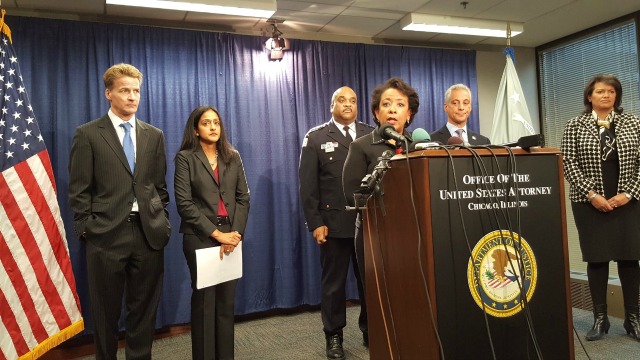Read DOJ's Upsetting Findings From Its Sweeping Chicago Police Investigation
By Rachel Cromidas in News on Jan 13, 2017 5:22PM

Attorney General Loretta Lynch speaks as Department of Justice announces results of probe into Chicago Police Department / Photo: Aaron Cynic
The U.S. Department of Justice has released the results of its year-long investigation into the Chicago Police Department, and the results aren't pretty—but also not entirely surprising.
The DOJ's findings show that the police department violated the constitutional rights of Chicagoans, particularly when it comes to use of force. The findings say officers violated the Fourth Amendment when using deadly force in an unreasonable manner, particularly:
• Shooting at fleeing suspects who presented no immediate threat;
• Shooting at vehicles without justification;
• Using less-lethal force, including tasers, against people who pose no threat;
• Using force to retaliate against and punish individuals;
• Using excessive force against juveniles;
Given the disturbing videos we've seen in recent years of Chicago cops appearing to do all of the above, the findings don't necessarily represent a big revelation. However, they do validate the critiques of CPD that local and national activists have been levying for years, and hopefully will compel a way forward toward sweeping department reforms. During Friday morning's announcement Mayor Rahm Emanuel told reporters that he has entered into an agreement with the DOJ that will lead to a legally-binding mandate for how CPD should be reformed.
The DOJ also lays out a long list of patterns of misconduct and abuse of power within the department found during the investigation. On excessive force, the DOJ says CPD has been:
• Failing to effectively de-escalate situations or to use crisis intervention techniques to
reduce the need for force;
• Employing tactics that unnecessarily endanger officers and result in avoidable shootings
and other uses of force; and
• Failing to accurately document and meaningfully review officers’ use of force.
On police accountability (and lack thereof):
• The city fails to investigate the majority of cases it is required to investigate by law.
• When it does investigate, the questioning of officers is aimed at eliciting information
favorable to the officer, and investigators do not confront officers with inconsistent
physical evidence.
• The city does not take sufficient steps to secure accurate and complete witness
statements, including by preventing officers from concealing misconduct.
• Discipline is haphazard, unpredictable and does not deter misconduct.
On systemic deficiencies found within CPD:
• Inadequate training and supervision;
• Insufficient support for officer wellness and safety;
• Data collection systems that impede transparency;
• A promotions system seen as political and unfair by officers; and
• Failure to adequately address racially discriminatory conduct by officers—which in some
respects is caused by deficiencies in CPD’s systems of training, supervision and
accountability—and the corrosive effect on police legitimacy of excessive force, which
falls most heavily on Chicago’s communities of color.
“We found that the Chicago police department engages in a pattern or practice of using excessive force" -@TheJusticeDept pic.twitter.com/Nk0X903FHl
— CBS Evening News (@CBSEveningNews) January 13, 2017
Under the agreement in principle that the Mayor's Office has signed with the DOJ, the city will be expected to reach a legally-binding settlement agreement that will address and resolve each of these issues. The federal consent decree, as the future agreement will be called, will be overseen by an independent monitor. And if the city doesn't comply, the DOJ can file a federal lawsuit against Chicago over the constitutional violations. That should mean that, no, the city cannot ignore this report. However, with the DOJ likely changing hands under the Trump Administration to an Attorney General appointee more concerned with police morale than reform, it's unclear what measures the Trump DOJ will pursue to keep holding Chicago and other cities with troubled police departments accountable.
On the bright side (Really—there's a bright side?) the DOJ says the city and the police department have already "committed to reform" and "taken several promising steps." OK. Here's a shortlist of what CPD is doing right, according to the DOJ:
• Creating the Civilian Office of Police Accountability to replace IPRA;
• Issuing a new transparency policy mandating the release of videos and other materials
related to certain officer misconduct investigations;
• Beginning a pilot program for body-worn cameras, to be expanded CPD-wide; and
• Committing to establish an anonymous hotline for employees to report misconduct.
There's also a list of actions the DOJ has taken to help CPD so far in the past year:
• The department helped CPD develop an important force mitigation and de-escalation
training course for officers and offered technical assistance with respect to CPD’s force
policies.
• The department has been working with the city of Chicago as part of the Violence
Reduction Network, a data-driven, evidence-based initiative that delivers strategic,
intensive training and technical assistance.
You can read the full report here.